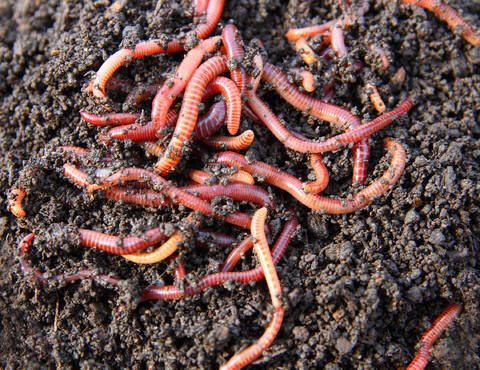Red wigglers: For small-scale composting
Red wigglers: For small-scale composting
Blog Article
Using Red Wigglers for Efficient Organic Garbage Disposal
Making use of red wigglers for organic garbage disposal presents a compelling strategy to handling food scraps while promoting ecological sustainability. These worms not just boost waste disintegration yet likewise yield useful worm castings, which can dramatically boost dirt wellness. Their capability to refine huge quantities of organic product with very little initiative positions them as an available service for homes and neighborhoods alike. Nonetheless, understanding the subtleties of establishing a successful worm container and preserving an optimal habitat is vital for optimizing their advantages. The next actions in this procedure might amaze you.
Advantages of Utilizing Red Wigglers
Among the most compelling benefits of making use of red wigglers for organic garbage disposal is their amazing efficiency in composting. These worms, clinically known as Eisenia fetida, are particularly adapted for breaking down natural materials, allowing them to refine waste as much as twice their body weight daily. This quick disintegration not just accelerates the composting process however also creates nutrient-rich worm castings that significantly improve soil top quality.
In addition, red wigglers add to a decrease in garbage dump waste. By diverting natural materials from garbage dumps, they aid lessen methane exhausts-- a potent greenhouse gas. This eco-friendly advantage is critical in the fight versus climate change.
Furthermore, red wigglers are low-maintenance and can prosper in various environments, making them available for both beginner and knowledgeable composters. Their ability to reproduce swiftly makes certain a stable populace, promoting continuous waste handling.
Establishing Your Worm Container
Creating an efficient worm bin is vital for optimizing the advantages of composting with red wigglers. Make certain the bin has ample drainage openings to stop excess dampness, as red wigglers grow in a wet yet not soggy atmosphere.
(red worms)Following, prepare the bedding material, which offers as the worms' habitat and food resource. The container needs to be put in a dark, temperature-controlled location, ideally in between 55 ° F and 77 ° F, to preserve worm activity.
Once the container is established up, present the red wigglers, enabling them to accommodate to their new setting. A well-kept bin will not just sustain the wellness of the worms but likewise promote effective disintegration of natural waste.
(Lake James Bait)
What to Feed Red Wigglers
An understanding of the proper diet plan for red wigglers is vital for maintaining a healthy worm populace and enhancing composting effectiveness. These items not only offer important nutrients however likewise contribute to the wetness balance within the worm container.
It is critical to stay clear of particular foods that can hurt the worm population. Red wigglers should not be fed meat, dairy products, oily foods, or processed products, as these can bring in bugs and create undesirable odors. red wigglers. Additionally, citrus fruits and hot foods should be decreased, as their acidity can be destructive to worms
To promote optimum food digestion, food should be cut right into smaller pieces, assisting in quicker malfunction and consumption. Introducing food in moderation is additionally essential; overfeeding can cause anaerobic conditions and bring in undesirable insects. Keeping track of the worm container for food intake prices will certainly aid make certain that red wigglers are obtaining an ample diet plan while maintaining an effective composting environment. Correct feeding methods are necessary for fostering a growing environment within the worm container.
Keeping Your Worm Habitat
A well-kept worm habitat is essential for the wellness and performance of red wigglers. To make sure optimum problems, it is essential to keep an eye on temperature level, wetness, and aeration within the worm bin (red wigglers).
Moisture degrees must be kept consistent; the bed linens must be wet yet not soaked. An excellent guideline is to preserve wetness at around 70% to 80%. If the bed linens ends up being as well wet, it can result in anaerobic problems that are dangerous to the worms. Adding dry carbon-rich materials, such as shredded paper or cardboard, can assist absorb excess moisture.

Making Use Of Worm Castings in Gardening
Rich check out this site in nutrients and valuable bacteria, worm castings act as an extraordinary natural fertilizer for horticulture. Created through the digestive processes of red wigglers, these castings have an array of crucial nutrients, including nitrogen, phosphorus, and potassium, which advertise robust plant development. Unlike artificial plant foods, worm spreadings offer a slow-release system, making sure that nutrients are readily available to plants over an extended duration, thus lowering the threat of nutrient leaching and soil exhaustion.
Along with nutrient material, worm castings boost dirt structure and oygenation, enhancing wetness retention and drainage. The microbial life existing in worm castings assists to suppress microorganisms and advertises a healthy dirt environment, further profiting plant wellness. When integrated into the soil or utilized as a leading dressing, worm castings can dramatically increase seed germination prices, root growth, and overall plant vigor.
For optimum outcomes, garden enthusiasts need to use worm castings at a rate of 1-2 inches per square foot, mixing them into the soil or including them into potting mixes. Overall, utilizing worm spreadings is an environment-friendly technique to enhancing dirt fertility and ensuring flourishing yard atmospheres.
Final Thought

Report this page